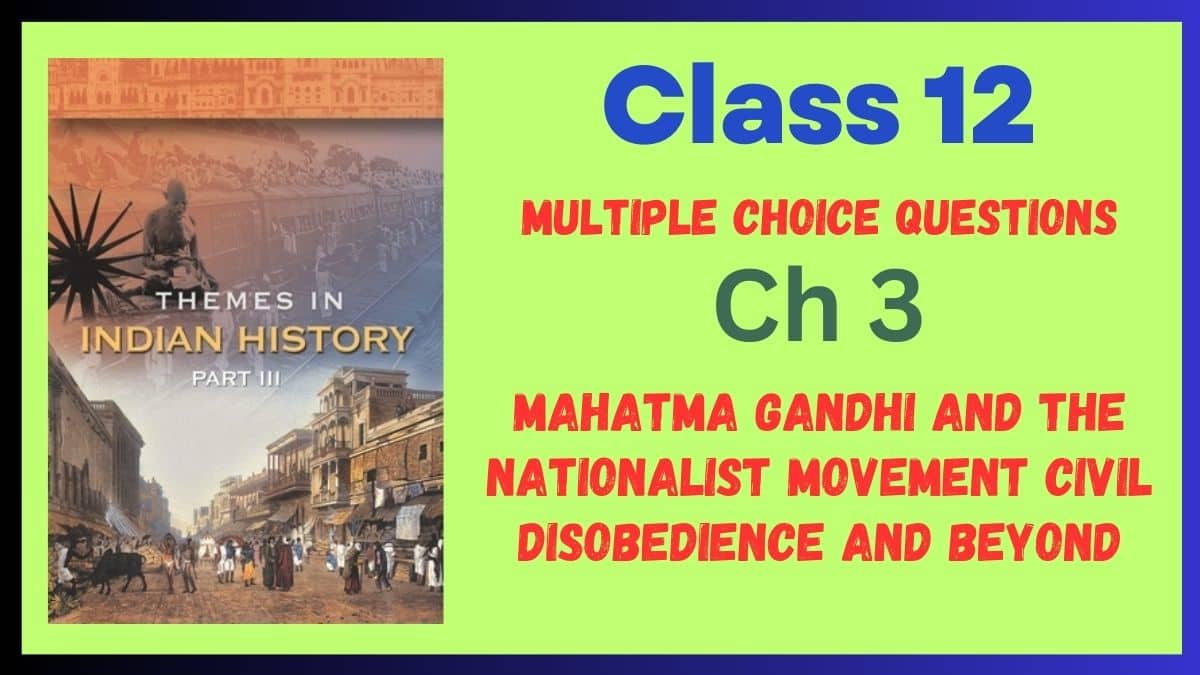This article presents a set of 10 multiple-choice questions (MCQs) designed to test and reinforce understanding of the fundamental concepts covered in Chapter 3 – Mahatma Gandhi and the Nationalist Movement Civil Disobedience and Beyond of the NCERT Themes in World History Part 3 of Class 12. These questions will help the students in their preparation for the upcoming examinations. Use these questions for revision; also check the answers in the answer key provided at the end of the article.
Chapter 3 – Mahatma Gandhi and the Nationalist Movement Civil Disobedience and Beyond
This article presents a set of 10 multiple-choice questions (MCQs) designed to test and reinforce understanding of the fundamental concepts covered in Chapter 3 – Mahatma Gandhi and the Nationalist Movement Civil Disobedience and Beyond of the NCERT Themes in World History Part 3 of Class 12. These questions will help the students in their preparation for the upcoming examinations. Use these questions for revision; also check the answers in the answer key provided at the end of the article.
10 MCQs on Chapter 3 – Mahatma Gandhi and the Nationalist Movement Civil Disobedience and Beyond
1. What was the primary philosophy adopted by Mahatma Gandhi during the Nationalist Movement in India?
- Communism
- Socialism
- Capitalism
- Non-violent Civil Disobedience
2. During which campaign did Mahatma Gandhi first employ the strategy of Civil Disobedience on a large scale?
- Quit India Movement
- Non-Cooperation Movement
- Salt Satyagraha
- Swadeshi Movement
3. Which event marked the beginning of the Civil Disobedience Movement in 1930?
- Dandi March
- Jallianwala Bagh Massacre
- Chauri Chaura incident
- Round Table Conferences
4. What was the primary objective of the Salt Satyagraha led by Mahatma Gandhi?
- Demand for independence
- Protest against the salt tax
- Boycott of foreign goods
- Rights for peasants
5. Which of the following statements is true regarding Mahatma Gandhi’s concept of ‘Sarvodaya’?
- It emphasizes individual prosperity
- It focuses on the welfare of all
- It promotes a caste-based society
- It advocates for technological advancement
6. The Non-Cooperation Movement launched by Mahatma Gandhi aimed to:
- Demand complete independence
- Boycott British goods and institutions
- Protest against the Rowlatt Act
- Seek constitutional reforms
7. Which incident led to the suspension of the Non-Cooperation Movement in 1922?
- Jallianwala Bagh Massacre
- Chauri Chaura incident
- Partition of Bengal
- Quit India Movement
8. What role did Mahatma Gandhi play during the Round Table Conferences?
- He led the conferences
- He boycotted the conferences
- He negotiated for Indian interests
- He organized protests against the conferences
9. The term “Harijan” coined by Mahatma Gandhi refers to:
- Congress leaders
- Dalits
- British officials
- Muslim leaders
10. Which movement called for Indians to resign from government jobs, schools, and colleges as a protest against British policies?
- Quit India Movement
- Swadeshi Movement
- Civil Disobedience Movement
- Non-Cooperation Movement
Answer Key
- d) Non-violent Civil Disobedience
- c) Salt Satyagraha
- a) Dandi March
- b) Protest against the salt tax
- b) It focuses on the welfare of all
- b) Boycott British goods and institutions
- b) Chauri Chaura incident
- c) He negotiated for Indian interests
- b) Dalits
- d) Non-Cooperation Movement
|
Class 12 History Chapter 3: Mahatma Gandhi and the Nationalist Movement Civil Disobedience and Beyond | Download PDF |
Also Read:
Themes in Indian History MCQs for Class 12 for Board Exams 2024 – Part 1
Themes in Indian History MCQs for Class 12 for Board Exams 2024 – Part 2



